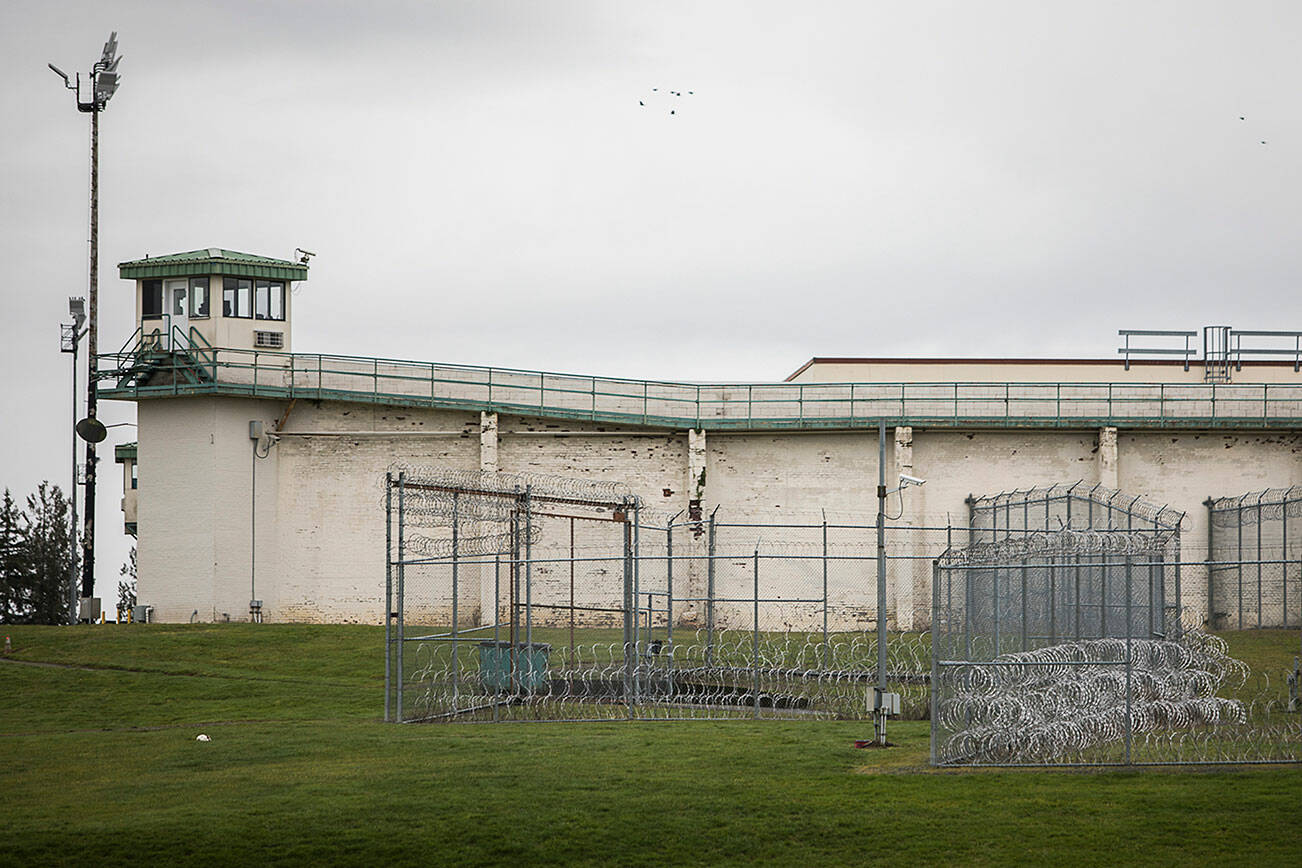Charles Longshore is the author of a bill Washington lawmakers considered this year that would have allowed judges to review and shorten long prison sentences.
He’s also behind bars, serving a nearly 36-year sentence at a state prison north of Olympia for killing two people in 2012. Longshore’s done a lot to change his life while incarcerated, including getting involved in legislative work.
“Incarcerated people benefit from having access to the Legislature because it provides meaning and purpose in a person’s life to be part of something bigger than yourself,” Longshore said. “It’s a rehabilitative model to be able to talk to elected officials and be heard. It acknowledges your humanity.”
The Department of Corrections recorded 32 requests from prisoners to testify on bills during this year’s legislative session, and at least 18 got to testify. Advocates say testimony from prisoners has grown in Olympia since virtual testimony became common during the pandemic.
But Longshore and others allege the Department of Corrections has made it difficult for them to engage with lawmakers. Activists in prison say they feel silenced by what they describe as the agency’s lack of support for – and sometimes even interference with – their political advocacy.
The department says staffing issues and logistical challenges limit what they can do to facilitate prisoner testimony. An agency spokesperson, Christopher Wright, said the Department of Corrections has requested funding from the Legislature to construct designated virtual hearing rooms for testimony and court appearances, but hasn’t received the money.
Two days after the bill that Longshore authored passed the House, he received a sanction from the Department of Corrections for “collecting money for legal services,” which prisoners aren’t allowed to do. According to Longshore, he was referring other prisoners to free legal services.
All of Longshore’s emails, visits and phone calls were cut off by the Department of Corrections until March 15, about a week after this year’s legislative session ended. The bill didn’t become law this year. The agency said they don’t sanction prisoners for legislative work, but will restrict communication privileges if prisoners break the rules.
“In my mind, they trumped up the sanction to cease my communications,” Longshore said.
Longshore’s situation has caught the attention of lawmakers and advocacy groups.
On March 20, over 15 organizations, including the Washington State Office of Public Defense, and over 40 individuals, including Democratic Reps. Tarra Simmons and Strom Peterson, sent a letter to the Department of Corrections calling on the agency to “CEASE AND DESIST from infracting incarcerated individuals for their participation in the legislative process.”
The letter says access to the Legislature is protected under the First Amendment, which includes the right to petition the government.
“Who are they to deny access to the Legislature?” Longshore said.
Testimony behind bars
Virtual testimony by prisoners in the Washington Legislature predates the pandemic. Former Democratic lawmaker Jeannie Darneille was the first to facilitate testimony by incarcerated people about seven years ago.
“My Republican colleagues thought I had jumped off a bridge or something,” Darneille said.
Darneille said hearing from incarcerated youth and adults helped dispel stereotypes other lawmakers held about prisoners and her colleagues were “very moved” by the testimony. Soon after, the state ended its practice of incarcerating juveniles for truancy and other noncriminal offenses.
Prisoners say speaking in front of the Legislature is empowering.
Jojo Ejonga said testifying is a “great honor and a privilege,” as well as his constitutional right. Ejonga, who is incarcerated at Stafford Creek Corrections Center in Aberdeen, testified in 2023 for a solitary confinement bill and again in 2024 for Longshore’s legislation. He alleges the agency initially refused to schedule him for testimony for the 2023 bill before he received help from Sens. Tina Orwall and Karen Keiser’s offices.
“Every citizen and resident of the state of Washington should be involved in the political process,” Ejonga said. “I might not have the right to vote, but to engage in the laws that affect me and my loved ones — that doesn’t stop. I’m very grateful the Legislature allows us to voice our concerns.”
‘We strive to find a balance’
This year’s legislative session marked the largest number of prisoners testifying in recent memory, according to both Longshore and Darneille.
But a few weeks into the 2024 session, Corrections instituted a new policy, limiting testimony to three prisoners per committee. In a Jan. 17 email to lawmakers and advocates, executive policy director of the department, Melena Thompson, said the number of requests and short notice in receiving them “is highly problematic.”
The email lists a number of logistical challenges, including the burden on staff members, who must monitor the testimony in-person. Thompson’s email to lawmakers said there have been requests for as many as 10 prisoners for one hearing, including six prisoners from one facility.
“We strive to find a balance between participation by those who are incarcerated who want to share their thoughts and experiences with the legislature and minimizing the impact on others and the operations of the prison facilities,” Thompson wrote.
The agency encourages prisoners to submit written testimony, which it says is much less burdensome. However, lawmakers say hearing directly from prisoners is instrumental. Sen. Drew Hansen, D-Bainbridge Island, who introduced a bill to make prison phone calls free, called prisoner testimony “enormously powerful.”
“There’s no substitute for hearing from somebody directly impacted by a policy,” Hansen said. “The testimony was just — it made your head explode.”
Darneille, who led the Department of Corrections’ Women’s Prison Division until the day before the policy limiting prisoner testimony was released, said the agency is underfunded and understaffed in ways she didn’t realize as a legislator.
She called the restrictions “very sad” and said she didn’t have a role in coming up with them. “They pretty much cut me out of these discussions,” she said.
‘One of us made it’
Darneille said that when she was a state senator, she was largely alone in her criminal justice reform efforts. Now, a “whole team” of lawmakers is focused on this work, she said. One of them is Simmons, who is from Bremerton and is Washington’s first formerly incarcerated lawmaker. Simmons sponsored Longshore’s bill, known as the Judicial Discretion Act.
“She gave us hope that we could do it,” Longshore said. “One of us made it.”
“There’s now a voice there that can fill those rooms that we have had void for so long. To bring a perspective that most haven’t considered,” Longshore said.
Like Darneille, Simmons regularly takes other lawmakers on prison tours, which has influenced their policy positions and votes on legislation, Simmons said.
Hansen, for example, told her his free prison phone calls bill, which failed to pass this year, and other proposals, including his attempts to get more college classes into prisons, are a direct result of those tours.
“[Hansen] told me ‘Tarra, this is part of your legacy,’” Simmons said.
Simmons said legislation to remove barriers for formerly incarcerated people has led to more people like her in government. Her own “best friend in prison,” Carolina Landa, now works for the Washington State House Democratic Caucus.
The state has adopted laws in recent years designed to help formerly incarcerated people.
The bipartisan New Hope Act, approved in 2019, helps people to vacate certain convictions, and in 2018, lawmakers passed “ban-the-box” legislation, which prevents employers from asking about a criminal conviction during the initial stages of the job application process.
Simmons believes her presence has helped lawmakers see that people with felony convictions deserve a voice in the Legislature: “It’s harder to hate up close,” she said.
Washington State Standard is part of States Newsroom, a nonprofit news network supported by grants and a coalition of donors as a 501c(3) public charity. Washington State Standard maintains editorial independence. Contact Editor Bill Lucia for questions: info@washingtonstatestandard.com. Follow Washington State Standard on Facebook and Twitter.





